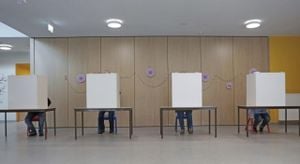The 2025 budget discussions among Arab countries are currently underway, spotlighting the economic hurdles and growth opportunities facing the region. With leaders convening to address financial strategies, the need for effective collaboration has become increasingly apparent, as the Arab world grapples with significant economic challenges.
A highlighted statement from an Economic Advisor, reported by Al Jazeera, noted, "The economic forecast for the upcoming year reveals both challenges and significant opportunities." This sentiment echoes throughout the discussions, as governments recognize the dire need to revamp fiscal policies and direct resources strategically.
The budgetary debates take place against the backdrop of fluctuated market conditions, rising inflation, and social demands for improvement. Officials from various nations have emphasized the necessity of prioritizing investments, particularly within education and infrastructure. The Minister of Finance articulated this need, asserting, "We must prioritize investments in education and infrastructure to stimulate growth," reflecting the views of many who see these sectors as pivotal for long-term improvement.
Countries have begun sharing their strategies openly to seek regional synergy. Insights from analysts have suggested, "Regional collaboration is key to overcoming our economic hurdles," as disparate nations come to terms with the interconnected nature of the modern economy. The dialogues extend beyond just fiscal plans; they encompass socio-economic reforms aimed at enhancing productivity and ensuring sustainable futures for the Arab populace.
Central to these discussions are the issues of youth unemployment and underemployment, which remain pressing across the region. Governments are increasingly focused on implementing training programs and initiatives to empower the next generation. During these conversations, many officials have iterated the importance of creating job opportunities to avert social unrest.
With the 2025 fiscal year looming, the urgency is palpable. Economic measures crafted during these debates will need to address both immediate financial relief and long-term solutions to systematic problems. Some countries are poised to make bold moves toward privatization and deregulation, hoping these actions will attract foreign investment and boost local economies.
While optimism is present, there are also voices highlighting the caution required to navigate this complex economic terrain. Economic forecasts underline the repercussions of global economic instability and regional conflicts, which could derail potential progress if not appropriately managed.
Government delegates are also weighing the environmental impacts of economic growth, aiming to incorporate sustainable practices throughout their budget proposals. The battle against climate change finds its way onto the agenda; ministers are exploring public-private partnerships to finance greener initiatives.
The dialogue around the 2025 budget isn't just about numbers; it's steeped deeply within social contexts and the realities of everyday citizens. Discussions around social safety nets and measures aimed at poverty alleviation are increasingly becoming central to these conversations. Budgetary decisions made this year could dictate whether the economic recovery is inclusive or leaves vast segments of the population behind.
Looking toward the horizon, what is clear is the transformative potential these budget discussions possess. The interactions and commitments forged among Arab nations could catalyze substantial shifts within the economies. Moving forward, nations must tread carefully, balancing aggressive growth aspirations against the pressing needs and voices of their people.
With negotiations and planning far from over, the anticipated outcomes from the 2025 budget discussions could serve as both beacon and barometer of regional economic stability. The decisions made today will inevitably sculpt the future of the Arab economies, paving the way for either progress or stagnation.



